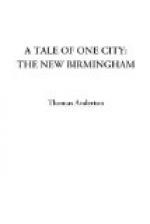When some of us recall past Birmingham Musical Festivals, and scan the schemes of bygone years, we cannot fail to be struck by the change that has taken place in musical taste and fashion. Especially do we note this in looking at the programmes of the festival evening concerts. In these programmes quantity as well as quality was an element not forgotten in the consideration and arrangement of the miscellaneous selections.
Twenty or thirty years ago we used to have—in addition to some one or more important works—a long string of scraps and snatches, chiefly from well-known operas, which protracted the concerts to a late hour. The liberal introduction of these excerpts was attractive to a large section of the public who did not care for fine works of musical art or “too much fiddling.” Moreover, it was in accordance with the taste and proclivities of the conductor, who gave, perhaps, an inkling of his real mind in a jocular remark made under the following circumstances.
It used to be the custom, after the morning performances, to ask the band and principal singers to stay and run through some of the operatic selections, &c., to be given in the evening. On one of these occasions, after a morning performance of “The Messiah,” Costa quietly and cynically remarked, “Now, ladies and gentlemen, let us have a little music.”
To come now to speak of more personal associations with the Birmingham Musical Festivals, it was in the year 1873 that I experienced the novel sensation of standing at the conductor’s desk. A trio of my composition—a setting of Tennyson’s “Break, break,”—was included in the programme of one of the evening concerts, and I had to conduct its performance. I tell you, my reader, it was a trying ordeal, and I hardly know how I got through it, but I did in some sort of fashion. Costa, I may explain, made it a rigid rule never to conduct a living composer’s music; consequently, he would have nothing to do with the performance even of my small trio. I found, however, a good friend in M. Sainton, the leader of the band. He took a kindly pity on me in my trying situation, and he did more to make my trio go well with his violin than I did with the conductor’s baton.
But it certainly was a sensation to face that immense orchestra, and I had something to do to make my sinews bear me stiffly up. My trio, however, was splendidly sung by Mdlle. Titieus, Madame Trebelli, and Mr. Vernon Rigby—pace Mr. Sims Reeves, indisposed—and if it did not make a sensation, and was not received with deafening plaudits, I fancy it went smoothly and satisfactorily, and I retired from the field—I mean from the conductor’s desk—not exactly with glory, but I think I may say without a stain upon my character as a local musical composer.




